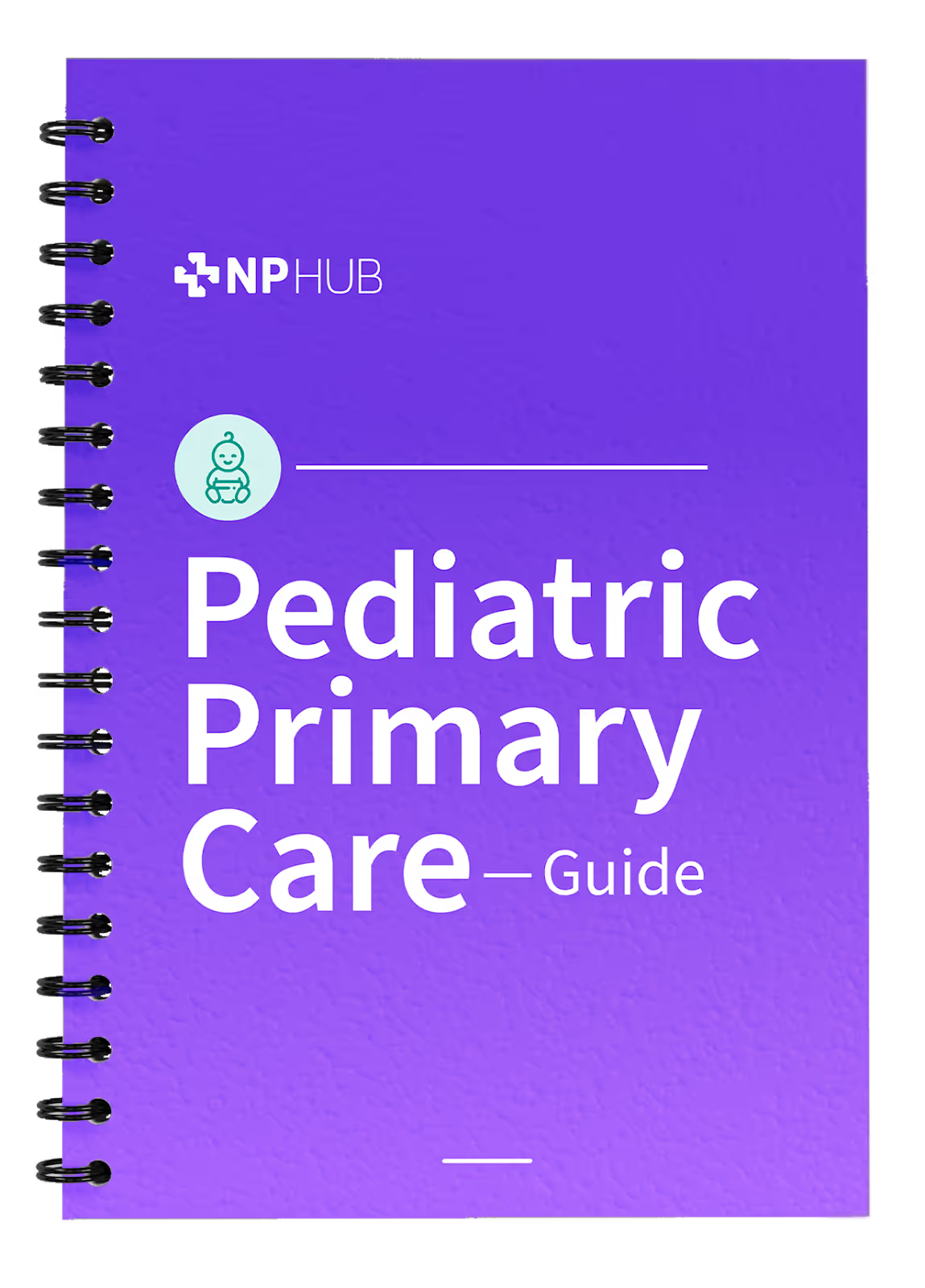What is pediatric primary care? At its heart, it's more than just treating children—it's a profound privilege that allows nurse practitioners to make lasting impacts on young lives while providing crucial support to parents and families.
Imagine guiding a worried parent through their child's health concerns or witnessing a young patient's well-being improve under your care. These meaningful moments define the journey of pediatric nurse practitioners, making this specialty uniquely rewarding.
However, transitioning from nursing school theory to hands-on patient care presents unique challenges, especially when your patients are kids who can't always express their symptoms clearly. As you prepare to deliver pediatric primary care services, you might encounter scenarios like:
- A tearful toddler refusing a routine visit examination
- Parents seeking immediate answers about their child's ear infections
- Families expressing hesitation about recommended immunizations
- Adolescent patients needing privacy to discuss sensitive health issues
- Growing self-doubt when making diagnoses under watchful eyes
These common challenges shouldn't derail your path to becoming a confident healthcare provider. That's why we're excited to share a stress-free solution: our comprehensive Pediatric Primary Care Handbook.
This invaluable resource, created by experienced pediatric specialist Dr. Sandra Pagenta, offers practical guidance for nurse practitioners transitioning into pediatric care. Whether navigating well-child visits or building trust with parents, this handbook serves as your roadmap to success.
In this blog, we'll explore how this free guide helps you deliver exceptional pediatric primary care services while maintaining both your patients' health and your peace of mind. Let's discover the essential tools that will transform your pediatric rotation into a confident, enriching experience.
The Growing Need for Pediatric Nurse Practitioners (PNPs)
As you prepare to step into pediatric primary care, it's important to understand the evolving landscape you're about to join.
Recent research highlights a pressing national need for more providers trained to deliver pediatric primary care services across the United States. Despite expansions in medical school and residency programs, there is still a shortage of pediatricians available to meet the healthcare needs of children—especially in primary care settings.
This shortage has opened a critical opportunity for nurse practitioners specializing in pediatrics to make a lasting impact on children’s health and well being.
Key insights from national data:
- NPs caring for children are essential: Approximately 18% of the entire nurse practitioner workforce is now delivering care to children in primary care and specialty settings.
- Not enough specialized training: Nearly two-thirds of NPs providing pediatric primary care are not specifically certified in pediatrics—meaning more trained Pediatric NPs are urgently needed to fill these gaps.
- Demand for dedicated pediatric expertise: Pediatric NPs offer a higher level of child-focused knowledge, critical for managing everything from routine well child visits and sports physicals to more complex issues like chronic illnesses or developmental concerns.
- Expanding access to care: Pediatric NPs play a crucial role in improving healthcare access, especially in communities where children might otherwise wait months for an appointment with a pediatric specialist or doctor.
- Workplace realities: Many pediatric NPs work in hospital-based settings, supporting pediatric primary care, inpatient services, and pediatric specialty care, alongside physician assistants and other healthcare providers.
When you provide stress-free, high-quality care during a routine well child visit or help a worried parent understand the signs of ear infections, you’re doing more than delivering a service you’re impacting how a child grows into a healthier adult.
Understanding what pediatric primary care really means goes beyond treating isolated illnesses. It’s about building long-term partnerships with families, supporting healthy development, guiding preventive immunizations, and ensuring that kids feel safe and cared for at every stage.
Common Challenges NP Students Face in Pediatric Rotations
As you embark on your pediatric rotation, you'll face unique challenges that go beyond what you've learned in the classroom. These hurdles are not just tests of your medical knowledge but also your adaptability, communication skills, and emotional resilience.
Understanding these common challenges can help you prepare and navigate your rotation more effectively. Let's explore the key areas where NP students often face difficulties.

Bridging the Gap From Textbook to Real Practice
While university training provides essential foundations, the reality of pediatric primary care differs significantly from textbook scenarios. Whether you're conducting sports physicals or treating common ear infections, you'll need to adapt quickly to each unique situation. Your decisions directly impact how each child grows and develops, making every patient interaction a crucial learning opportunity.

Decoding Non-Verbal Symptoms
Recognizing subtle symptoms in non-verbal patients is a critical skill in pediatric care. Infants and young children can't always articulate their discomfort, making your observational skills crucial. You'll need to become adept at reading body language, behavioral changes, and even the slightest physical signs to make accurate assessments.

Handling Nervous Parents
One of the most delicate aspects of pediatric care is managing anxious parents. Their worry is understandable – after all, their child's health is at stake. As an NP student, you must master the art of reassuring parents while maintaining professionalism. This involves clear communication, empathetic listening, and the ability to explain medical concepts in accessible terms. Remember, you're not just treating the child but also supporting the entire family unit.
Although these challenges may seem daunting, they are a natural part of your pediatric rotation. That's why our Pediatric Primary Care Handbook is designed to help you navigate these obstacles with confidence.
Introducing The Pediatric Primary Care Handbook
It's no secret that to thrive in your pediatric rotation and practice, you need more than just textbook knowledge. You need practical insights, proven strategies, and the confidence to apply your skills in real-world scenarios.
That's exactly why we created the Pediatric Primary Care Handbook.
This guide bridges the gap between classroom theory and clinical practice, providing you with the tools you need to navigate pediatric care. Whether you're struggling with anxious parents, decoding non-verbal symptoms, or building your diagnostic confidence, this handbook has you covered.

The handbook is authored by Dr. Sandra Pagenta, DNP, APN-BC, a seasoned professional with over 15 years of clinical nursing experience. As a board-certified Advanced Practice Nurse and a mother of two, Dr. Pagenta brings both professional expertise and personal insight to pediatric care.
This guide is packed with practical knowledge and insider tips to enhance your pediatric rotation experience:
- Get a solid grounding in pediatric care fundamentals, from taking detailed histories to performing thorough physical assessments on young patients.
- Gain an in-depth understanding of typical growth patterns and developmental milestones, crucial for accurate assessments.
- Learn to identify and treat common pediatric issues such as Acute Otitis Media, Upper Respiratory Infections, and Gastroesophageal Reflux.
- Discover strategies for conducting effective well checks, understanding immunization schedules, and providing preventive care.
- Improve your ability to conduct comprehensive Reviews of Systems (ROS) and present pediatric cases effectively.
By leveraging the insights in this guide, you'll be better equipped to handle the unique challenges of pediatric care, from calming anxious parents to recognizing subtle symptoms in non-verbal patients.
Conclusion: Your Path to Pediatric Care Excellence
As we've explored, the journey through your pediatric rotation is filled with unique challenges. With the right tools and mindset, you can transform these hurdles into stepping stones toward becoming an exceptional pediatric nurse practitioner.
The Pediatric Primary Care Handbook is designed to help you navigate the obstacles of this journey and achieve success, offering the insights and strategies you need to excel.
By downloading this free guide, you're taking a proactive step towards enhancing your clinical skills and boosting your confidence in pediatric care.
Frequently Asked Questions
Q: Is this guide suitable for NP students who haven't started their pediatric rotation yet?
A: Absolutely! The Pediatric Primary Care Handbook is designed for NP students at all stages. Whether you're preparing for your upcoming rotation or already in the midst of it, you'll find valuable insights and practical tips to enhance your pediatric care skills.
Q: How is this guide different from my textbooks?
A: While textbooks provide comprehensive theoretical knowledge, our guide focuses on practical applications. It bridges the gap between classroom learning and clinical practice, offering insider tips, strategies for common scenarios, and guidance on soft skills like parent communication that textbooks often don't cover in depth.
Q: How long will I have access to the guide after downloading it?
A: Once you download the Pediatric Primary Care Handbook, it's yours to keep forever. You can refer back to it throughout your rotation, during your studies, and even in your future practice as an NP.
Find a preceptor who cares with NPHub
Book a rotation.webp)








.webp)


.webp)



.webp)